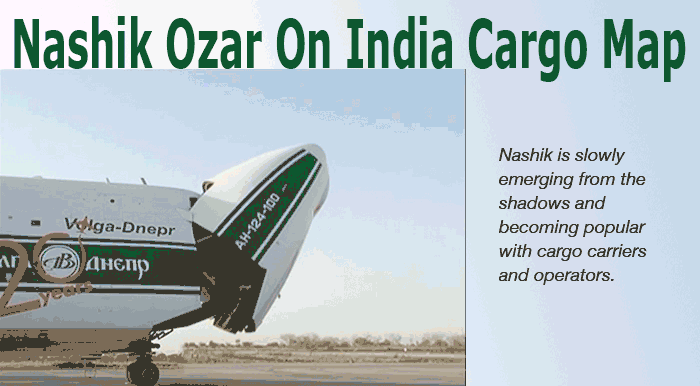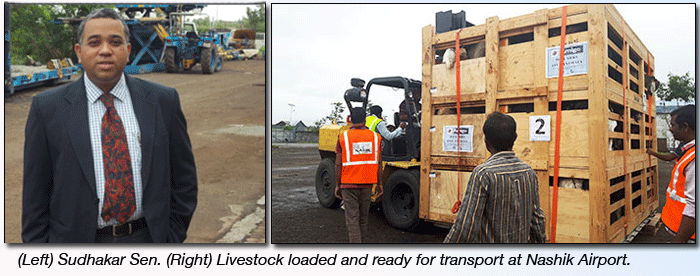
Nashik Airport
located at Ozar about 20 kilometers northeast
of the city of Nashik, Maharashtra, India is owned by Hindustan Aeronautics
Limited, which had used the airport primarily
to develop, test and build aircraft for the
Indian Armed Forces.
Now Nashik is
seeing a second life for air cargo; in fact
the airport will double its annual growth
in 2018 exporting goats and sheep to places
including the UAE.
Exporting Goats
and sheep to Sharjah started in 2016.
So far in 2018
12,356 goats and sheep had been dispatched
from Nashik via eight flights. The animals
are usually sent during the monsoon season
(June to August).
Get
His Goat
 |
A logistics veteran,
Sudhakar Sen, CEO, HALCON (a joint venture
between Hindustan Aeronautics Ltd and Container
Corporation of India, that manages the airport)
spoke exclusively to FlyingTypers.
“Yes,
the executive said,” the number of flights
are rising and the stats depict the confidence
of the trade.
“In 2016-17,
the airport handled nine freighters a month
while in 2017-18, the number went up to 38.
“This
year between April 1, 2018 and July 18, 2018,
Nashik saw 22 freighters and also handled
129 scheduled passenger flights.
“While
the airport has handled a wide variety of
cargo – including an AN-124, it is ready
to send out pharma products to Kabul in Afghanistan.”
Elsewhere airport
sources indicated that there would be two
such cargo flights a month.
“About
100 tons of pharma products will transit Nashik
each flight.”
As Sen pointed
out, “HALCON has been handling export
pharma cargo at the air cargo complex for
last five years. “These pharma consignments
are transported to the gateway airport (Mumbai)
through bonded trucking.”
Sen emphasized
that HALCON was “actively working to
facilitate the direct air uplift of the pharma
cargo from Nashik Airport.”
Price
& Location
Freight forwarders
pointed out that Nashik would be ideal for
pharma exports since there are quite a few
pharma manufacturers in the city as well as
in neighboring Aurangabad, around 185 km away
by road.
“These
pharma units could avoid an already congested
Mumbai airport – around 165 km by road
– and send their goods out from Nashik
Airport,” FlyingTypers was
told.
“In fact,
the airport wants to get 20-25 per cent of
the 40,000 tons a month of cargo currently
handled by Mumbai airport.”
An
Airport Centerstage
“Nashik
is slowly emerging from the shadows and becoming
popular with cargo carriers and operators,”
CEO Sen declares adding,
“Response
is immense and in addition to non-scheduled
freighters recently, we handled 8 B747 freighter
technical landings in June 2018.”
About
Nashik
It was way back
in September 2011 that the HALCON-operated
Nashik Airport (well known as Ozar Airport)
started its commercial services).
The airport
has a large cargo facility as well as a passenger
terminal.
With passenger
services started at the end of last year,
came belly cargo. For example, the Jet Airways
flight, which launched Delhi-Nashik-Delhi
sector on June 15 is carrying export cargo
for London and Dubai.
“With
this the trade and industry in Nashik is getting
direct access to the international market,”
Sen said.
Along with Jet,
IndiGo and SpiceJet have also started operations.
“The Regional Connectivity Scheme will
act as a catalyst for economic growth of the
Nashik region.
“As we
say, the economy of a nation flows in the
wings and wheels of transportation,”
Mr. Sen declared.
Future
In The Wings

Hanuman statue at Nashik, India. |
HAL decided
in 2005-6 to start commercial operations from
the airport and offered the government-run
Container Corporation of India Ltd. (CONCOR)
(whose core business is being a carrier, a
terminal operator, and a warehouse operator)
11 acres of land for cargo operations.
As Sudhakar
Sen put it: “HALCON is a successful
marriage between HAL and CONCOR two of India’s
well known PSUs. CONCOR fulfils its role providing
cargo handling and Customs operations and
HAL provides air traffic control and navigation
services.”
The airport’s
cargo division has seen a 44 percent rise
in exports between April 2017 and March 2018
(5,500 tons in comparison to 3,800 in the
previous year). Of that, 2,000 tons consisted
of perishables, vegetables and fruits along
with goats and sheep.
The air cargo
complex at the airport was inaugurated in
March 2008. With a major investment of Rs
70 crore from HALCON, the cargo complex has
put in warehouses, an integrated packing centre
for perishables, cold storage, facilities
for comprehensive ground handling services,
CCTV surveillance, screening, bar-coding,
labelling and Customs clearance.
Nashik Airport
officials firmly believe that the airport
will become the forwarders’ choice.
Mr. Sen pointed
out that when plans to start commercial operations
were drawn up, there were issues regarding
connectivity and the runway.
All that was
a dozen years ago.
Today, with
all the clearances from the Directorate General
of Civil Aviation, the airport handled a B747-400
ERF some time ago and is now all set to handle
all wide-bodied aircraft.
Comparing Nashik
to other cargo airports (there are none in
India yet), Sen said there was provision for
all the special handling facilities for heavy
cargo, engineering goods, pharma and perishable
goods at substantially lower costs.
“With
low cost airlines ruling the skies, low cost
airports is an idea whose time has come and
Nashik Airport aims to lead the way,”
he said.
Even as the
government regional connectivity initiative
gets going, Nashik airport hopes to bring
down logistics costs. Sen said that the aim
was to reduce cost by bringing the airport
facility virtually to the customer's doorstep.
“We believe
that regional airports like ours can reduce
transportation time and costs for the industry.
Low Cost Connectivity
“As a
low-cost cargo airport we complements operations
at other airports by providing feeder services.”
Sen believes
that the airport would enable the large number
of manufacturers in and around Nashik to connect
to major markets by air.
“Space
has been created to enable forwarders and
airlines to set up offices within the airport.
“We would
also like to leverage Nashik’s agricultural
produce.
“The airport
can be an emerging cargo hub because of its
proximity to major cargo generating centers.
“It serves
the major agricultural belt of Maharashtra
and the state’s third largest industrial
belt with six agri zones and a Special Economic
Zone.
Days
of Wine & Roses
“The city
is also known as the wine capital of India.
“While
the wine produced – both red and white
– from the 29-odd wineries is for domestic
consumption, a lot of it is exported to countries
around the world,” Sudhakar Sen concluded.
Tirthankar Ghosh
|




 Vol.
17 No. 41
Vol.
17 No. 41 Vol.
17 No. 42
Vol.
17 No. 42